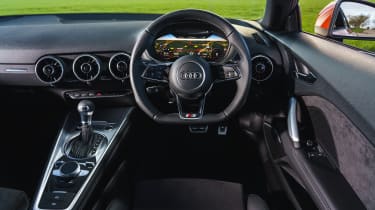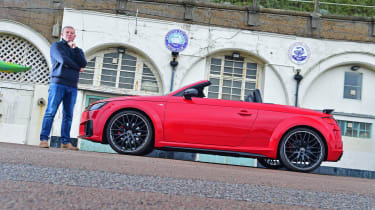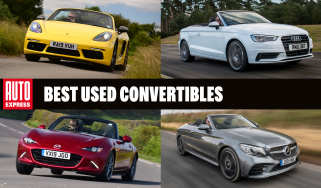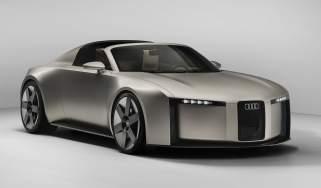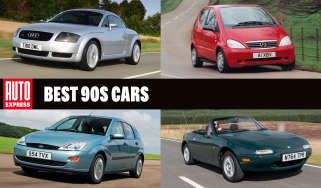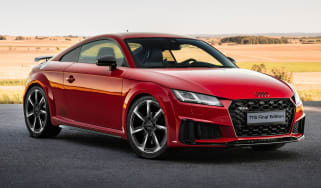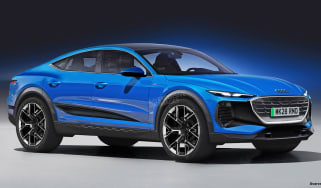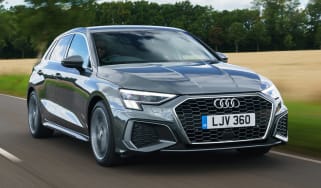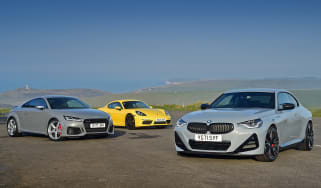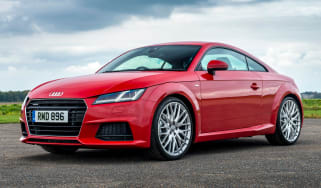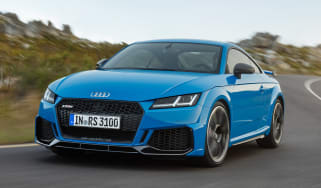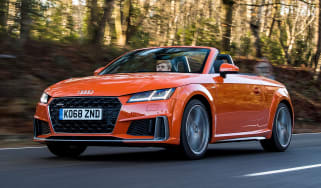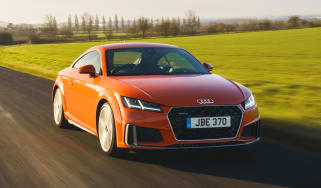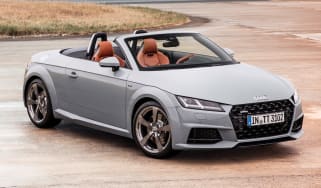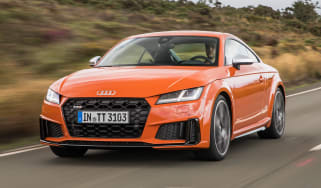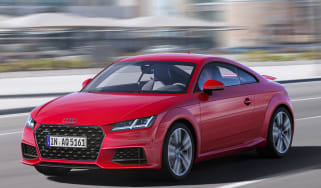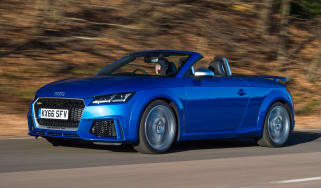Audi TT (2014-2024) review
The Audi TT is a truly accessible sports car; stylish and good to drive, with a well-crafted interior and impressive onboard technology

Just so you know, this is a review of a new 2014-2024 TT. If you are interested in information about a used Audi TT, please follow the links provided.
The third-generation Audi TT has been on sale since 2014, but it continues to deliver head-turning style, while it's also more enjoyable to drive than ever. It's party piece continues to be its interior design and excellent build quality which is up there with the very best in class, and efficient TFSI petrol engines make it even more appealing.
If you're a keen driver you may be drawn towards the dynamic skill of the BMW 2 Series Coupe, or the Porsche Cayman, but if you want a well-resolved, thoroughly capable sports coupe, then the Audi TT is still worth a look.
About the Audi TT
The Audi TT has been on sale in the UK for more than 20 years, and in that time it has established itself at the cutting edge of design and tech for the German company. The TT has matured into a pint-sized supercar, with similarly athletic looks to the top-of-the-range R8 model, along with more engaging handling and onboard technology.
The third generation Audi TT arrived in 2014 and was given an update in 2018 with the latest tech from other Audi models. As it has been on sale for a while, there are rivals that have come and gone. Cars like the Peugeot RCZ and Volkswagen Scirocco have fallen by the wayside, and the only other direct opponent is the BMW 2 Series, although of course that model line-up consists mostly of rear-wheel drive versions, compared to the TT's front or quattro four-wheel drive.
Used - available now

2022 Volvo
XC40
22,441 milesManualPetrol1.5L
Cash £20,549
2019 Vauxhall
Mokka
60,000 milesAutomaticPetrol1.4L
Cash £8,995
2017 Audi
A6 Avant
82,700 milesAutomaticDiesel3.0L
Cash £17,000
2012 Hyundai
i20
91,309 milesManualPetrol1.2L
Cash £2,995As there are a broad range of TT variants, including 2+2 Coupe and two-seat Roadster models, there are more rivals than this. Buyers could consider the Mazda MX-5 at the entry point to the range, or there's the the Toyota GR Supra. At the top of the range, the TT does battle with cars such as the Porsche 718 Cayman and Boxster, while even the Ford Mustang is a similar price.
There are five TT trim levels to choose from: Sport, Sport Edition, S line, Black Edition and Vorsprung, in either Coupe or open-top Roadster body styles.
Two petrol engines are available, badged 40 and 45 TFSI petrol units. Both units are based on the ubiquitous 2.0-litre turbo four-cylinder motor, with the 40 TFSI rated at 194bhp and the 45 TFSI coming with 242bhp.
The front-wheel-drive 40 TFSI uses Audi's seven-speed S tronic auto, while the six-speed manual 'box is no longer available. The 45 TFSI model comes with quattro four-wheel drive as standard.
The TTS quattro delivers 302bhp via its 2.0 TFSI engine and includes adaptive dampers, while the 2.5-litre five-cylinder TT RS produces 394bhp - both use the same seven-speed S tronic transmission.
The standard range offers decent value, with prices starting from around £34,000. The TT Roadster is approximately £1,750 more than the Coupe, while moving up from 40 TFSI to 45 TFSI costs £4,600 extra. Moving from Sport to S line adds just over £2,000 to the price, while Black Edition cars are around £1,600 extra on top of that. Those wanting the style and luxury afforded by the Vorsprung trim will have to dig deep, as this commands a £6,000 premium over the Black Edition variants.
Engines, performance and drive
The Audi TT has always been a coupe that’s blended driving enjoyment with everyday usability and ease of driving. The latest car is lighter, faster and more efficient than ever. In short, it's the first TT that feels like a proper sports car. Based on VW Group’s MQB platform, the latest TT uses a short wheelbase version of these adaptable underpinnings, yet compared to the Mk2 TT, there’s still an extra 37mm between the axles, which helps handling and ride comfort.
With steel used low down in the chassis and aluminium extensively featuring in the body construction, Audi’s Space Frame technology has been refined to ensure the 2.0-litre TFSI is 50kg lighter than its predecessor – and it feels it.
As a result the driving experience is sharper and more engaging than TTs of old. The 2.0-litre TFSI engine is punchy and smooth, delivering enough performance for the front-wheel drive 194bhp 40 TFSI model to hit 0-62mph in 6.6 seconds. Opt for the 242bhp 45 TFSI quattro S tronic and this drops to 5.1 seconds.
We tested the TT 45 TFSI quattro in S Line trim, which boasts impressive off-the-line performance thanks to its standard four-wheel drive system. This makes light work of putting the engine’s 242bhp and 370Nm of torque to the ground and gives the TT great reserves of grip and traction. The engine has loads of mid-range punch in this guise, but feels a little breathless at the upper reaches of the rev range.
In this configuration, the TT is very easy to drive quickly, though it’s not particularly entertaining. The suspension feels slightly firm on UK roads, but the car still flows nicely down a B-road. Steering is sharp but too light, with very little feedback offered through the wheel. All models are fitted with Audi’s progressive steering system, which has a rack that becomes more direct as the wheel is turned.
Audi’s Drive Select system is also standard across the range, and for the first time it adjusts the all-wheel-drive on quattro models to give a sportier set-up in Dynamic Mode. It also modifies the throttle response, steering weighting and air-conditioning load, plus the shift speeds on S tronic automatic cars, while petrol versions get a racier exhaust note in Dynamic mode.
As with other Audi models, the Drive Select gives owners a choice of Comfort, Dynamic, Efficiency and Auto modes, plus you can set up your favourite mix of modes in the Individual setting.
All Sport versions come with 18-inch wheels, while the S line upgrades to 19-inch alloys. Firmer sport suspension is standard, so although the 20-inch wheels found on Black Edition and Vorsprung variants look great, they do make the ride more unsettled on bad surfaces, and increase road noise in the otherwise refined cabin.
Generally, ride quality is better than in the Mk2 TT, particularly on the smaller wheels, and Audi again offers its Magnetic Ride dampers as an option. On the plus side, wind and road noise are well isolated from the cabin, and across the range the TT strikes an even better balance between sports car fun and coupe comfort.
0-62mph acceleration and top speed
The TFSI petrol engines are punchy and smooth, and the 40 TFSI – which comes only with front-wheel drive and S tronic transmission – delivers 194bhp and 320Nm of torque. That allows it to cover 0-62mph in just 6.6 seconds. The 45 TFSI quattro makes 242bhp and 370Nm, which cuts the 0-62mph time to 5.1 seconds.
Sitting at the top-of-the-range, the 394bhp TT RS model is capable of a 3.7-second 0-62mph time and a 155mph maximum.
MPG, CO2 and running costs
The least powerful 2.0-litre petrol, the 40 TFSI, comes with a seven-speed S tronic gearbox, claiming 42.2mpg economy and CO2 emissions of 153g/km, while the 45 TFSI – in quattro all-wheel-drive S tronic guise – delivers 35.3mpg and 181g/km. Opting for the Roadster model sees a slight fall in efficiency, with the 40 TFSI managing a best of 40.9mpg, and 157g/km of CO2.
Moving up to the performance-focused TT S version still sees average fuel economy of 34mpg, although emissions rise to 189g/km. The 394bhp TT RS pays the penalty for running its 2.5-litre, five-cylinder petrol engine, with an economy figure (on the combined cycle) of 31.7mpg - which is perhaps rather optimistic if you intend to exploit the full power of the RS on a regular basis. CO2 emissions start at 202g/km.
Insurance Groups
Predictably, the 40 TFSI models are the cheapest versions of the Audi TT to insure; they fall into group 35. The 45 TFSI is in group 37 in both manual and S tronic guises and group 39 for the quattro model.
Depreciation
Despite being on sale since 2014, the third-generation TT is still a relatively strong performer on the used market. Our expert data suggests that, after a typical three-year/36,000-mile ownership period, it should hold onto around 53 per cent of its original list price. The new BMW 2 Series offers similar residuals, while the Porsche Cayman betters both its rivals by retaining between 60 to 68 per cent of its showroom price after three years of motoring.
To get an accurate valuation on a specific model check out our free car valuation tool...
Interior, design and technology
There’s no mistaking an Audi TT for anything else. In common with iconic models like the Porsche 911 and MINI, the unique shape has evolved while remaining instantly recognisable. The original two-seater was a breath of fresh air, but the TT has grown from a curvy, cute car into a more rakish, sharply-styled package.
The third-generation model is almost identical in length to the outgoing version, but as the wheelbase has grown by 37mm, it has shorter overhangs and tauter-looking proportions. At the front, the single-frame grille, tapered bonnet lines and razor-sharp headlights give a hint of the second-generation Audi R8.
However, with rounded wheelarches, curved windscreen pillars, a bold shoulder line and a sloping tailgate, all the unmistakable TT styling cues are there to see. And while the TT was updated in 2018, the car's looks were left relatively unchanged.
Sport models get 18-inch wheels as standard and come with Xenon headlamps and LED running lights, while S line versions benefit from a sportier look thanks to their 19-inch wheels, deeper side sills, unique bumpers and gloss black grille. The Black Edition adds further gloss black detailing, black 20-inch wheels and a rear wing. The top-of-the-range Vorsprung trim brings Matrix LED headlights, sport seats upholstered in Nappa leather and a Bang & Olufsen stereo.
However, for all the exterior’s familiar and classy looks, it’s the cabin that’s the real highlight. All cars come with DAB radio, heated front seats and multi-function steering wheel, while as you’d expect in a TT, material quality is superb throughout, with tactile and beautifully executed switchgear. Circular air vents integrating the control function and display for the air-conditioning are another highlight. The central trio feature the temperature, airflow and fan speed control, while the outer pair by the doors have the control for the heated seats. This really is a beautifully designed cockpit.
As you’d expect from Audi, there’s also huge scope to add high-end options and personalise the leather, inlays and materials. But whichever trim you go for, the TT’s interior makes you feel special every time you get behind the wheel.
Stunningly designed and beautifully executed, the interior is focused around Audi’s superb Virtual Cockpit system. This 12.3-inch high-resolution LCD driver display replaces both the conventional dials and centre stack screen, allowing for a sleek minimalist dash design that’s both sporty and upmarket.
The screen itself is crystal clear and places all information in front of the driver. It can be switched between Classic View – with prominent speedo and rev counter – or Infotainment View, which brings functions like the navigation map to the fore.
Telephone, media, trip and car setting functions all appear on the Virtual Cockpit screen and can be controlled using the touch-sensitive MMI dial or the multifunction wheel. The clarity of the screen, combined with the dual-functionality of the controls, makes Audi’s Virtual Cockpit a real joy to use.
Sat-nav, stereo and infotainment
The TT’s infotainment forgoes a touchscreen – or even a standalone display. Instead, the system is integrated into the Virtual Cockpit digital panel. It’s unconventional but works well, and is controlled by a clickwheel on the centre console – a set-up that used to be common in Audis, but has since been superseded by newer arrangements.
Entering postcodes and addresses can be quite time- consuming, but scrolling through menus – even on the move – is easy, especially as you barely need to divert your eyes away from the road to read the screen. There are some physical shortcut buttons, too.
Loading times are slower than we'd like and the resolution isn’t as sharp as you'll find in some rivals, but overall the graphics look great. Of course, Android Auto and Apple CarPlay are also fitted; these minimise the size of the speedo and rev counter, and centre the smartphone apps between them.
Practicality, comfort and boot space
Audi’s sporty coupe majors on design, but with that sloping roofline, it loses out on practicality. Although the TT is technically a 2+2, treat it as a two-seater only and it’s surprisingly usable.
Up front it’s perfectly roomy, with a good range of adjustment for the steering column and seats, while the long coupe doors mean large, practical storage bins. There’s also a deep tray in front of the gear lever and a smaller space for mobile phones between the front seats.
All models come with an electric parking brake, while Audi’s latest MMI control system and Virtual Cockpit are intuitive. With smaller A-pillars and a bigger windscreen than before, visibility is good for a low-slung coupe, too.
Dimensions and size
The Audi TT hasn’t grown in its latest generation, but there’s a little more available space inside thanks partly to an increase in the wheelbase.
It’s still relatively compact compared to rivals, though. At 4,191mm, it’s noticeably shorter than the BMW 2 Series Coupe (4,432mm) and Porsche 718 Cayman (4,379mm). At 1,832mm wide, the TT is close to the Cayman, but 15cm narrower than the 2 Series Coupe. In terms of height, the Audi (1,353mm) sits between the BMW (1,418mm) and Porsche (1,295mm).
Leg room, head room & passenger space
Those back seats might make all the difference for family buyers trying to justify a TT, but they are pretty cramped; they’re only really suitable for adults on very short, occasional journeys and are perhaps best left for small children.
It’s not just legroom behind the front bucket seats that’s severely limited; headroom is tight, too, thanks to the rake of the bootlid. There’s no centre seatbelt, so you can only carry two, although there are Isofix child seat mounts.
Boot space
The big hatchback opening at least makes access to the boot easy, but the luggage area is quite shallow, so with the rear seats in place the TT offers only 305 litres of room. Lower the rear seats, and boot space rises to 712 litres, making this a versatile two-seater sports car.
Reliability and safety
The Audi TT didn't feature in our 2022 Driver Power customer satisfaction survey, while Audi itself finished in 22nd spot out of 29 manufacturers in the best brands poll - up from 23rd position in 2021.
It has to be said that the first TT Mk3 we ran on our fleet suffered from a few electrical niggles, although the build quality and finish inside were impressive. The mechanical elements should be pretty resilient, too, particularly as so much of the car’s engineering under the skin is shared across the VW Group.
Euro NCAP awarded the TT a four-star crash test rating; it missed out on the maximum score as Audi doesn’t offer city braking technology. The independent testing body now requires this to be fitted to award a five-star rating as part of its more rigorous assessments. Nevertheless, you should be able to assume Audi’s small coupe is safe in all the most fundamental areas, and there are lots of protective electronic systems available to uprate the safety envelope.
The only trouble is, if you want these clever safety aids, you’ll have to pay for many of them as extras. Six airbags and a tyre pressure monitor come as standard, although Audi side assist (which offers a blind spot monitoring function), and a traffic sign recognition system, are individual options priced at around £600 each.
Warranty
The Audi TT comes with a run-of-the-mill three-year warranty capped at 60,000 miles, which certainly inspires less confidence than the unlimited mileage cover provided over the same time period on the Porsche Cayman and BMW 2 Series.
Servicing
Three years of servicing a mid-spec Audi TT should cost around £900, but Audi does provide fixed-rate service plans that help owners spread the cost of scheduled maintenance.
Audi TT Roadster long-term test
Our contributing editor, Steve Sutcliffe, spent six months with the Audi TT Roadster in Final Edition trim as part of our long-term test fleet. While many would assume that the TT’s soft-top is best-suited to the summer, Steve believes that Audi’s roadster is actually suitable for driving all year-round. This is thanks to its clever design and heating system, along with build quality that’s absolutely top-notch. Steve’s entire time with the TT proved to be fun-filled and trouble-free, which makes it all the more sadder that a new model isn’t in the works.

